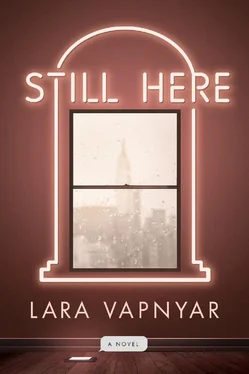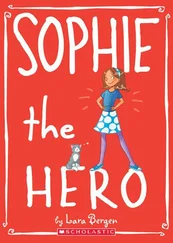Eden took her mostly immigrant employees on a tour of the house, a beautiful house, decorated with all the antique country stuff — there was even a collection of old irons — abstract photographs done by Eden’s husband, and abstract sculptures done by Eden’s sons. The boys ran in after a soccer game, sweaty, out of breath, flushed, confident, happy — and Vica had thought that Eric could make friends with them! When the tour was almost over, Vica decided to make up for her faux pas with the clothes and the strawberries and pay some amazing compliment to the house. “Eden,” she said, “your house looks just like Howards End.” Eden answered her with a blank stare. “Howards End,” Vica explained, “the house in Forster’s novel.” Blank stare again, followed by a kind smile. Vica knew that before switching to premed at Harvard Eden had been an English major. There was no way that she didn’t know who Forster was. Vica had read the novel in Regina’s translation, perhaps the novel had a different title in English. And then Vica got it. Eden didn’t expect Vica to know Forster (Vica — a simple immigrant ultrasound technician), just like she didn’t expect one of her goats to bleat “Fors-ter.” Eden gave Vica a polite, uncomprehending, but approving, perfectly democratic smile specially designed for her immigrant employees — Russian, Jamaican, Filipino, or whatever else they happened to be.
To add insult to injury, by the time they emerged from the house, the largest goat had eaten all of Vica’s strawberries and about half of her hat. Vica picked up her bag and the remains of her hat and decided to go home without waiting for the food.
Vica’s other botched attempt to make a friend at work was with Christine, another radiology technician. Christine was older than Vica, but not by much. She was a tall woman with rolls of fat pushing against her scrubs in expected and unexpected places. Her skin was of a perfect chestnut color, and her hair, black with a touch of gray, was done in gleaming cornrows. It was Christine who made the first move, back when Vica started working at Bing Ruskin. She offered some friendly advice, which Vica gladly accepted. They started having lunch together and chatting whenever they had a chance. In addition to professional advice, Christine gave Vica a lot of pointers on child-rearing, pie baking, ordering swimsuits online (you had to order Speedo at least three sizes too large), and American ways in general. Christine’s manner had always been good-natured and caring, if a little patronizing. “Oh, so you have your cool black friend now?” Vadik would tease. “Shut up, Vadik,” Vica would answer. But then things changed. The problem was that Christine took Vica for a struggling immigrant single mother. There was a picture of Eric clipped to Vica’s locker, but she never talked about Sergey. Then one day somebody mentioned a cousin applying for a job at Gray Bank, and Vica said that her husband worked there too. “Oh, yeah?” Christine asked. “What does he do?” “He’s a financial analyst,” Vica said. “Oh, yeah?” Christine said again, and just like that, the friendship was over. Christine’s husband worked as a mechanic, Leslie’s husband was a bus driver, Sheena’s husband worked as a security guard there at Bing Ruskin, Rachel and John were divorced, Michael’s wife held the exact same position as he did but at Weil Cornell, and the youngest technician Liliana was single — she was all about dates and parties and fun. Having a husband at Gray Bank instantly turned Vica into this fanciful white lady who chose this job for some bizarre reason. Vica remembered what Bob’s daughter, Becky, said about about her job at McDonald’s. She worked there when she was a junior in high school. Bob thought it was important for her to experience a “real job.” She told them how the other employees hated her, how they all gathered to stare at her getting into Bob’s new Volvo after work, and how the nicer she was to them, the more they hated her. So that was how Christine saw Vica now? A spoiled rich brat who didn’t really have to earn her living, who took this job just for the experience? But who in her right mind would choose to work at a cancer hospital, at a job that was both physically and emotionally exhausting, while being exposed to continuous radiation? There were times when Vica felt the urge to explain to Christine how things really stood, to tell her about Sergey’s employment history, about how stupid they had been to buy that insane house that was just a big rotting piece of shit, and about how lonely she felt in the U.S. with no relatives and no real friends, just Regina and Vadik, both of whom preferred Sergey to her. But then she would remember how Regina had tried to explain to them that she wasn’t really that rich, and how ridiculous that had sounded. And then pride would get the better of her. Why did Vica have to justify herself to Christine? And so they were cordial but not friendly. Certainly not friendly enough to talk about something as personal as the separation.
“Mom,” Eric said, “Mom! I’m cold.”
Vica rubbed his back. While she was doing that she noticed that Eric’s glasses were dirty. She gasped and yanked them off, scratching his ear in the process. “Mom!” he protested.
“Hey! You should have cleaned them before we left,” Vica said.
She could just see how these stains on the lenses would jeopardize Eric’s chances at the test. Misread equation, misinterpreted sentence, blurry expression, fatal mistake. And there was nothing to clean the glasses with. Nothing. Nothing at all. Vica unbuttoned her coat, breathed on the lenses, then wiped them with the hem of her sweater. Eric turned away, embarrassed but resigned. “Here,” she said, setting the glasses back on his face. “Thanks,” Eric said, but she thought she caught a note of sarcasm. When they were just outside of the door, she opened his backpack and did a quick check: pencils, papers, all in place. Pink slip squeezed in his hand.
“Don’t drop the slip.”
“Mom, I won’t!”
Okay, he probably wouldn’t drop the slip. But then another horrible thought slashed through Vica’s mind. Last year, when she took him out of school on Staten Island to take a test for another school for the gifted and talented (although not quite as gifted and talented as children admitted to the Castle), Eric decided to venture to the bathroom in the middle of the exam. He couldn’t find it and then, once he found it, he couldn’t poop right away because he was too nervous, and by the time he got back, they were already collecting the tests. He left twenty answers blank. Twenty answers blank!
Vica reached out and tapped the Susan Sontag in front of her on the shoulder.
“Do you know if they let the kids go to the bathroom?”
“Excuse me?” Susan Sontag said.
Yes, Vica knew that she spoke with an accent, but it wasn’t that bad, it wasn’t like you couldn’t understand her. Susan Sontag’s daughter (her huge ears half hidden behind her pigtails) answered for her.
“They don’t! Once you hand in your pink slip, that’s it, you can’t go anywhere! And there are no windows in the school. Not a single one! Look, not a single one!”
Susan Sontag shushed her daughter and glared at Vica as if she had just said something completely inappropriate, had brought up a subject that should never be brought up in front of children, like sex, death, or financial troubles.
“Make sure you use the bathroom before they take your pink slip,” Vica said to Eric.
“Mom, please!”
He was already in, talking to a guard and showing her his pink slip, when Vica noticed that she’d forgotten to zip his backpack. It was too late for her to squeeze through the crowd of children and zip it, and even too late to yell her son’s name. There he went, with the backpack gaping like a hippo’s maw. Seeing Eric among strangers, separated from her, made Vica look at him through the eyes of a stranger, which never failed to overwhelm her with disappointment. He was not a lovely child. He was awkward. Slouchy. Pale skin sprinkled with large freckles, dull eyes, droopy cheeks. Fat. Not obese, no, and not exactly fat yet, but getting there. Soft, squashy. Helplessly soft.
Читать дальше












